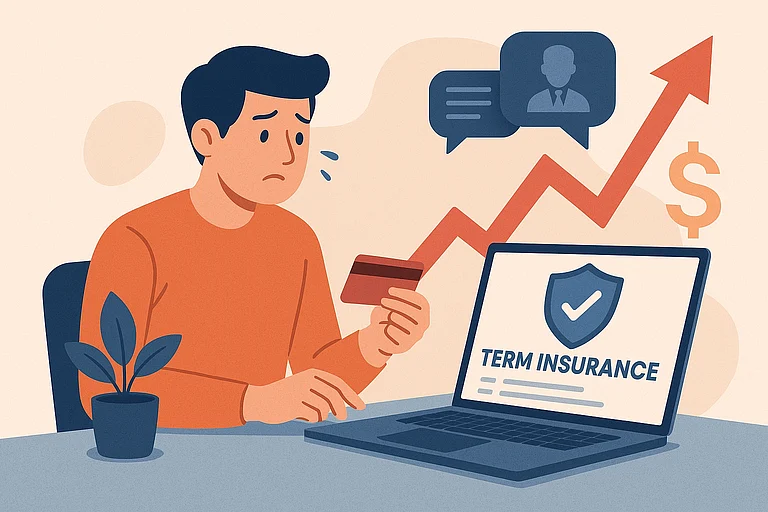It has been a persistent and grave problem in the insurance sector for years - products being pushed onto customers who don't need them, don't fully understand them, or were outright misled about them. Mis-selling, particularly through banks, has led to thousands of complaints and a steady erosion of trust in the insurance industry. But India's insurance regulator doesn't appear keen to intervene directly in how these products are sold.
Insurance Mis-selling: Why Is Irdai Reluctant To Regulate Distribution?
For now, it seems that Irdai's focus remains on expanding insurance penetration, improving public awareness and not 'mis-selling'. Recent data revealed that banks earned over Rs 1,700 crore in commissions in FY24 alone from selling financial products, largely insurance and mutual funds
The Insurance Regulatory and Development Authority of India (Irdai) has clarified that it doesn't plan to manage insurance distribution channels, even as complaints continue to pour in. At an event by the Insurance Awareness Committee (IAC) to launch 'Sabse Pehle Life Insurance' awareness campaign last week, Swaminathan S. Iyer, Member (Life) at Irdai, seemed to shift some responsibility back onto customers, suggesting that a mismatch between consumer understanding and product features was part of the problem.
"It's not necessary that every mis-selling is mis-selling," he said as quoted in a report by Mint, implying that confusion over product complexity might be just as much to blame as aggressive sales tactics.
This will not seem to be the case if you look at the numbers. Irdai's own data shows over 127,000 complaints were filed in the financial year 2023, with roughly half of them involving life insurance companies and allegations of unfair practices. The Bima Bharosa portal alone recorded more than 124,000 grievances that year, 20 per cent of which were classified under "unfair business practices", a category that includes mis-selling.
So if the scale of the problem is clear, why is there regulatory reluctance?
Iyer emphasised that the insurance regulatory body has already facilitated "open architecture," allowing banks to partner with multiple insurers. However, it does not plan to force them to diversify beyond their group companies. That decision, he said, might fall under the Reserve Bank of India's jurisdiction.
For now, the focus remains on expanding insurance penetration and improving public awareness. Distribution, Iyer stressed, "cannot be mandated." He, however, mentioned that the regulator can facilitate it and will work towards it.
Insurance Mis-selling: What does the data say?
Meanwhile, data from a separate investigation report by 1 Finance Magazine reveals just how deeply the system is tilted. The report noted that banks earned over Rs 1,700 crore in commissions in FY24 alone from selling financial products, largely insurance and mutual funds. But here's the catch: many of those products never fulfilled their intended purpose. A significant chunk of insurance policies were either surrendered, lapsed, or discontinued early.
Nearly 43 per cent of all benefits paid by the top 10 life insurers fell into this SWDL (surrendered, withdrawn, discontinued, or lapsed) category. In many of those cases, customers walked away with nothing or next to nothing. But commissions? Still paid out.
What is more, the persistency ratio, which is a measure of how long customers continue to pay premiums, remains troublingly low. Just over half of policyholders stick around for five years. The rest drop off, often losing money in the process.
The problem becomes even more murky if you consider that many of these products are being sold by banks from their own group companies. This is not illegal, but it raises obvious questions about transparency and conflict of interest. Are customers being advised, or are they being sold to?
HDFC Life's CEO Vibha Padalkar, speaking to Mint recently, defended the role of banks in insurance distribution. There is no conclusive data that mis-selling via bancassurance route is worse than mis-selling done through other channels, she said. "Our focus should be on strengthening processes, not curtailing bancassurance."
This could be true, however, there is also the pressure on those doing the selling. According to an October 2024 report from 1 Finance, more than half of the relationship managers surveyed at Indian banks admitted they had mis-sold financial products to meet sales targets. About 51 per cent feared being fired if they did not hit those numbers. Most, over 84 per cent, said they were under intense pressure to sell.
From perpetual bonds sold as fixed deposits to high-premium policies sold to elderly customers with no income continuity, the list of questionable sales tactics is long. This was extensively covered in Outlook Money's April 2025 issue 'Mis-Selling Saga: Lies Bank RMs Tell You To Meet Targets'.
Late last year, even the Finance Ministry had to step in. It directed banks and non-bank financial companies to stop offering incentives for insurance sales and ensure that products matched customer needs. And last month, RBI Deputy Governor Rajeshwar Rao warned that mis-selling could severely damage trust in schemes meant to protect low-income households.
But while other regulators and government arms are making noises about reform, Irdai too should step up to curb the issue of mis-selling. When asked if the insurance regulator would consider a plan for listing of insurance companies, like how RBI does for banks, Iyer stated that Irdai indeed has issued an advisory on the same but has no plan to mandate it.
He said that Irdai would rather look at insurance listings on a case-by-case basis.
So where does that leave the average policyholder when it comes to insurance mis-selling? Still largely on their own. Until stronger checks are introduced, or until banks and insurers voluntarily rethink their sales culture, the onus remains on consumers to read the fine print, ask tough questions, and know exactly what they are signing up for.



